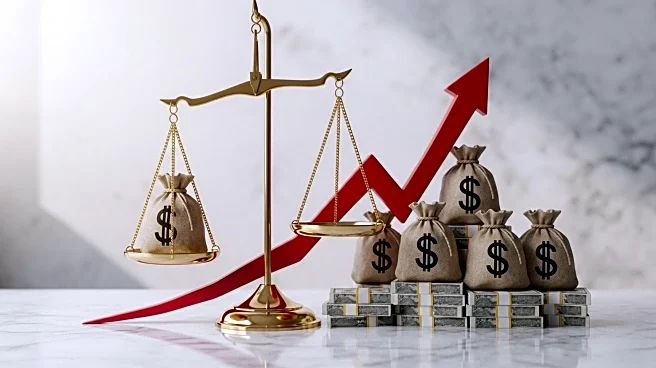What is the story about?
What's Happening?
President Trump has suggested the possibility of issuing tariff revenue checks to Americans, ranging from $1,000 to $2,000. This proposal, discussed in an interview with One America News, aims to offset the financial strain caused by tariffs. However, experts warn that these checks could be inflationary. Chris Motola, a financial analyst at National Business Capital, noted that the checks might create a feedback loop, encouraging further price hikes. Paul Johnson, an adjunct professor at Fordham's Gabelli School of Business, emphasized that consumers are likely to spend rather than save these checks, potentially exacerbating inflation. The White House has yet to unveil an official plan, and economists are speculating based on hypothetical policymaking.
Why It's Important?
The proposal for tariff revenue checks is significant as it could impact consumer spending and inflation. Historically, government-issued checks are used to stimulate spending, which can lead to inflationary pressures. With inflation already a concern due to previous stimulus packages, the introduction of tariff revenue checks could further affect the purchasing power of Americans. The checks are intended to alleviate tariff-related financial burdens, but they may also contribute to rising prices, affecting low- and middle-income households. The broader economic implications include potential shifts in fiscal policy and consumer behavior.
What's Next?
If President Trump's proposal gains traction, it could lead to debates on fiscal policy and its impact on inflation. Stakeholders, including economists and policymakers, may analyze the potential effects of such checks on the economy. The White House's response and any official plans will be crucial in determining the next steps. Additionally, the delayed inflation and jobs reports due to the government shutdown could influence the decision-making process regarding the checks.
Beyond the Headlines
The proposal raises questions about the balance between economic stimulus and inflation control. It highlights the challenges of using fiscal measures to address tariff impacts without exacerbating inflation. The political dimensions of the proposal suggest it may be more of a strategic move than an economically sound policy. The long-term effects on consumer behavior and economic stability remain uncertain, emphasizing the need for careful consideration of fiscal policies.
















